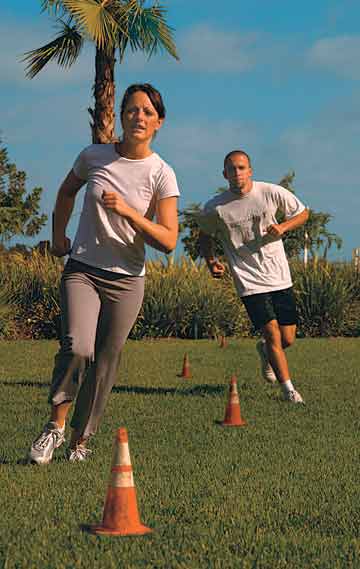Many people use that 4 week time period to develop new, healthy habits. Some quite smoking. Others focus on eating better - including eating "clean", going macrobiotic or vegetarian. Whether you're already a committed Vegan or want to try going Vegetarian for 4 weeks, it's important to know how to fuel your boot camp workouts. The American Council on Exercise has released their tips for getting the most out of a vegetarian diet.
Vegetarianism and Athletes
In response to increased levels of cholesterol and a greater risk of heart disease—or for countless other reasons—many Americans are making the switch from a diet dominated by hamburgers and hot dogs to one of veggie burgers and tofu.But is this type of diet a wise choice for athletes who need to maintain their strength and stamina?
The answer to that question is a qualified “yes.”
Whether you are an athlete or moderately active, you must be aware of the nutritional implications of vegetarianism and choose foods that will provide you with enough calories and nutrients to keep you healthy and strong.
There are four basic types of vegetarians. The first, lacto-ovo-vegetarians, omit meat, fish and poultry from their diets, but include animal products such as eggs, milk, yogurt and cheese.
The second and third types of vegetarians are lacto-vegetarians and ovo-vegetarians. Lacto-vegetarians, while excluding eggs, do include dairy products. Conversely, ovo-vegetarians do include eggs, but exclude dairy products from their diets. Both types exclude all forms of meat. Finally, the restrictive vegan diet excludes all foods derived from animals in any form.
Regardless of what type of vegetarianism may be your preference, it is essential to have a good understanding of basic nutritional principles to choose a balanced diet. Without this knowledge, vegetarians may find themselves deficient in nutrients generally derived from meat, eggs and/or dairy products, such as protein, iron, calcium and vitamins B12 and D.

Nutrient Know-how
Protein deficiency, though generally a rare occurrence in the Western world, is of concern, especially for vegans. Individuals who consume eggs or dairy products need not be worried about a protein deficiency.Vegans, however, should include high-quality proteins such as legumes, nuts and seeds in combination with whole-grain breads and cereals. Soy products and other meat substitutes also are good sources of protein. This is particularly important for endurance and strength athletes, who have slightly higher protein requirements than the average adult.
For vegetarians who drink milk or eat dairy products, getting enough calcium and vitamin D should not be a problem. For others, calcium may be found in vitamin D–fortified soy products, tortillas, some nuts, sesame seeds and self-rising flour.
Iron, a nutrient abundant in meat, can be found in eggs, legumes, nuts, seeds and spinach. Two or more servings of these each day is recommended for the average vegetarian adult.
Getting enough vitamin B12, which is often found only in animal foods and nutritional supplements, can pose a serious problem for vegans, especially those who are pregnant. Because this vitamin can be stored in our bodies for up to four years, a deficiency takes quite some time to develop. Women who are vegetarians and are of childbearing age should discuss this important nutrient with a physician or registered dietitian.
Getting What You Need
The high-fiber, low-calorie nature of most vegetarian foods may pose a problem for athletes. Very often the volume of vegetarian foods required to meet their energy needs is greater than their stomach’s capacity for food.When energy reserves drop too low, the body will convert its own muscle or protein to compensate for the deficiency, leaving little left over for growth. Eating several smaller meals throughout the day or snacking on foods that contain both carbohydrates and some protein may be helpful.
Despite the previously mentioned concerns, studies have shown that individuals on vegetarian diets have lower blood cholesterol levels, better digestive function and lower occurrence of certain types of cancer. Before making the switch to vegetarianism, however, remember that it takes careful planning and nutritional knowledge to achieve a healthy, well-balanced diet.
Additional Resources
Applegate, L. (2002). Encyclopedia of Sports & Fitness Nutrition. Roseville: Prima Publishing.Food and Nutrition Information Center, USDA—Vegetarian Nutrition: www.nal.usda.gov/fnic/etext/000058.html
Vegetarian Resource Group: www.vrg.org

No comments:
Post a Comment